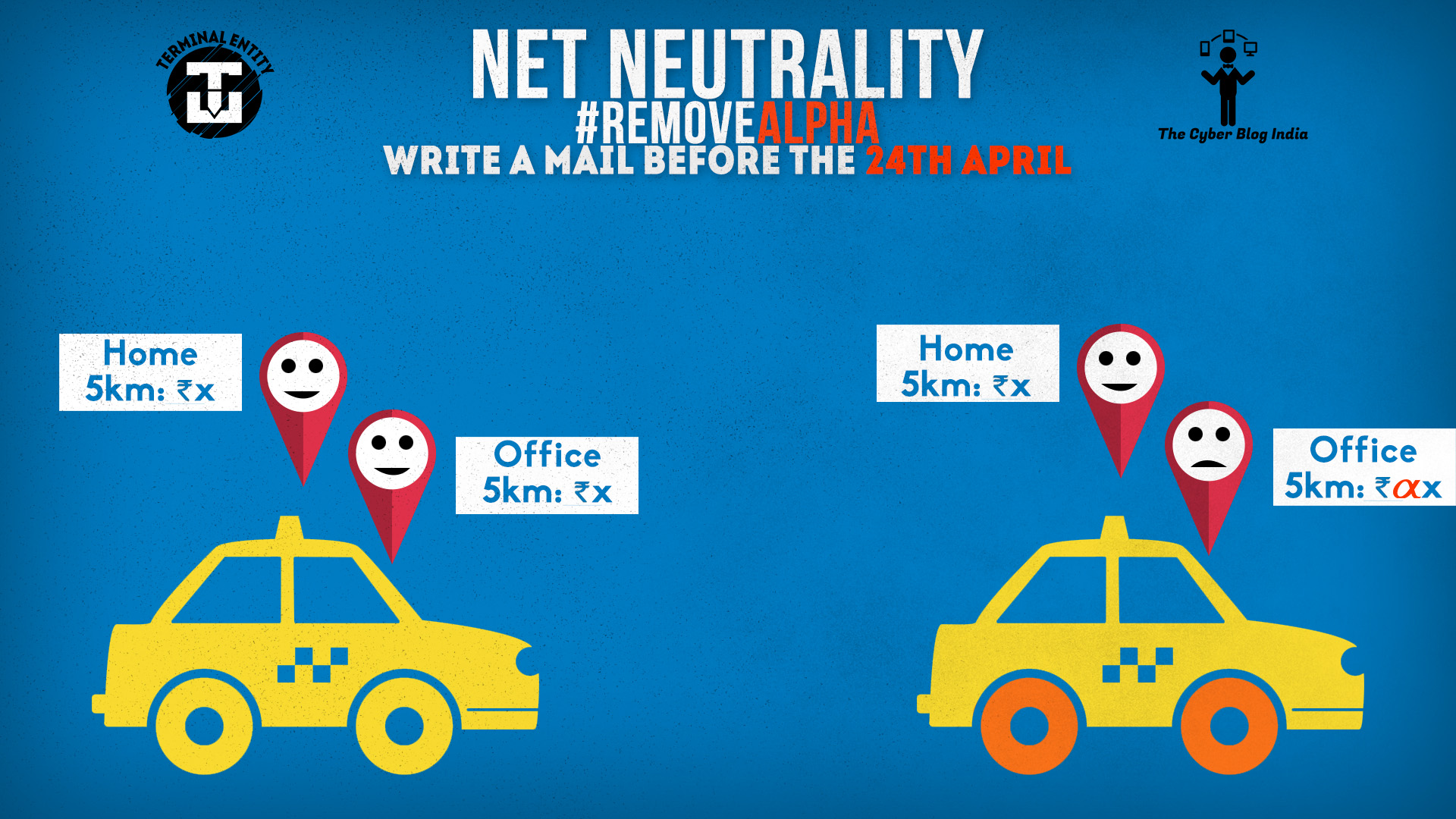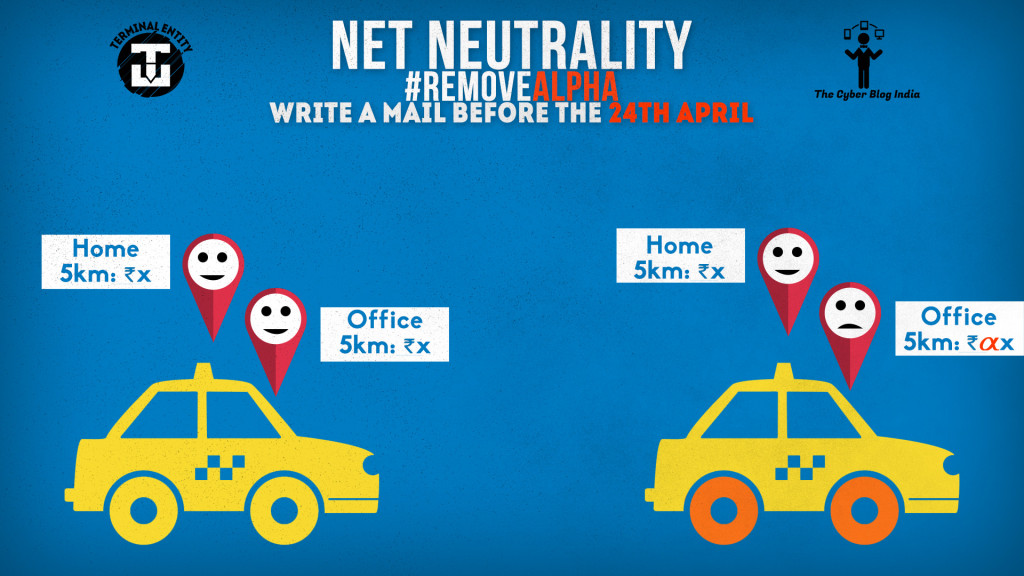Net neutrality in India and What is it?

Net neutrality has been one of the biggest questions in the recent times as far as the United States is considered. If you are updated, US got its net neutrality rules approved by the Federal Communications Commission (FCC) which is something like TRAI is in India. How it was dealt with in the US was very effecient where public discussion played a vital role. More importantly the public was aware and had opinions about net neutrality and there were even protests along with silent voicing of opinion.
Nonetheless, It is now our turn, Indians. Not just to let it happen but to voice our concerns and opinions and make an active contribution.
All you have to do is send an email before April 24th.
For those who don’t know what it is..
 A taxi driver is a taxi driver for you, you tell him the location you want to be dropped off to. He doesn’t say no if you ask him to take you back home or leave you at a shopping mall. The cost is per kilometre and he should treat it like that.
A taxi driver is a taxi driver for you, you tell him the location you want to be dropped off to. He doesn’t say no if you ask him to take you back home or leave you at a shopping mall. The cost is per kilometre and he should treat it like that.
The same is net neutrality. Whoever be your ISP, Airtel, Vodafone, BSNL or any of your local ISPs, they should treat all of your Internet traffic as packets of data. And that’s all, all packets, the same way.
In theory this is also called open internet. According to FCC,
“An Open Internet means consumers can go where they want, when they want. This principle is often referred to as Net Neutrality. It means innovators can develop products and services without asking for permission. It means consumers will demand more and better broadband as they enjoy new lawful Internet services, applications and content, and broadband providers cannot block, throttle, or create special “fast lanes” for that content. The FCC’s Open Internet rules protect and maintain open, uninhibited access to legal online content without broadband Internet access providers being allowed to block, impair, or establish fast/slow lanes to lawful content.”
Coming back to India
India doesn’t have any legislation for the way ISPs need to be treated. We have TRAI and doing the job as yet. Earlier last year there was the whole fuss about Airtel charging extra for VoIP traffic which was quashed very bad and established a precedent, but it is not enough.
As far as net neutrality goes, TRAI has issued a consultation paper on regulatory framework for Over-the-top services (OTT) like Viber, WhatsApp, Snapchat, Hike etc. TRAI has done this to ask for peoples’ feedback. It is focused on OTTS and their licensing and touches net neutrality in a few other questions.
Why you should do something about this is fairly simpler.
- How would you want your ISP to charge to chat on WhatsApp more than it would on Hike?
- How would you like if one online store runs at an amazing speed and the other’s website doesn’t even open?
- It all happens at the ISP levels and stuff like this is happening. I am sure nobody wants these scary things to happen.
- When Section 66A could be done away with, why not net neutrality for open internet and free speech?
What you need to do is just send an email to a TRAI email id. For this whole purpose we would recommend you to go here. (netneutrality.in)
Following is the list of the 20 questions, just in case you need a quick read.
- Is it too early to establish a regulatory framework for OTT services, since internet penetration is still evolving, access speeds are generally low and there is limited coverage of high-speed broadband in the country? Or, should some beginning be made now with a regulatory framework that could be adapted to changes in the future?
- Should the OTT players offering communication services (voice, messaging and video call services) through applications (resident either in the country or outside) be brought under the licensing regime?
- Is the growth of OTT impacting the traditional revenue stream of telecom service providers (TSPs)? If so, is the increase in data revenues of the TSPs sufficient to compensate for this impact?
- Should the OTT players pay for use of the TSPs network over and above data charges paid by consumers? If yes, what pricing options can be adopted? Could such options include prices based on bandwidth consumption? Can prices be used as a means product/service differentiation?
- Do you agree that imbalances exist in the regulatory environment in the operation of OTT players? If so, what should be the framework to address these issues? How can the prevailing laws and regulations be applied to OTT players (who operate in the virtual world) and compliance enforced? What could be the impact on the economy?
- How should the security concerns be addressed with regard to OTT players providing communication services? What security conditions such as maintaining data records, logs etc. need to be mandated for such OTT players? And, how can compliance with these conditions be ensured if the applications of such OTT players reside outside the country?
- How should the OTT players offering app services ensure security, safety and privacy of the consumer? How should they ensure protection of consumer interest?
- In what manner can the proposals for a regulatory framework for OTTs in India draw from those of European Telecommunications Network Operators (ETNO)? What practices should be proscribed by regulatory fiat?
- What are your views on net-neutrality in the Indian context?
- What forms of discrimination or traffic management practices are reasonable and consistent with a pragmatic approach? What should or can be permitted?
- Should the TSPs be mandated to publish various traffic management techniques used for different OTT applications? Is this a sufficient condition to ensure transparency and a fair regulatory regime?
- How should a conducive and balanced environment be created such that TSPs are able to invest in network infrastructure and Content and Application Providers (CAPs) are able to innovate and grow? Who should bear the network upgradation costs?
- Should TSPs be allowed to implement non-price based discrimination of services? If so, under what circumstances are such practices acceptable? What restrictions, if any, need to be placed so that such measures are not abused? What measures should be adopted to ensure transparency to consumers?
- Is there a justification for allowing differential pricing for data access and OTT communication services? If so, what changes need to be brought about in the present tariff and regulatory framework for telecommunication services in the country?
- Should OTT communication service players be treated as Bulk User of Telecom Services (BuTS)? How should the framework be structured to prevent any discrimination and protect stakeholder interest?
- What framework should be adopted to encourage India-specific OTT apps?
- If the OTT communication service players are to be licensed, should they be categorised as Application Service Providers (ASP) or Communications Service Providers (CSP)? If so, what should be the framework?
- Is there a need to regulate subscription charges for OTT communication services?
- What steps should be taken by the Government for regulation of non-communication OTT players?
- Are there any other issues that have a bearing on the subject discussed?
